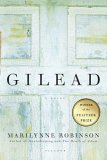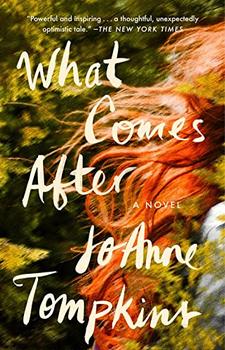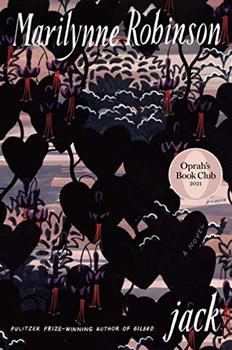Summary | Excerpt | Reading Guide | Reviews | Beyond the book | Read-Alikes | Genres & Themes | Author Bio

A Novel
by Marilynne RobinsonComment: Fans of Robinson's debut Housekeeping have been waiting 23 years for her to
publish a second novel and, according to the overwhelmingly glowing reviews, the
wait has been worth it. The story is told by the Rev. John Ames who at 77
years of age in 1956, and in failing health, decides to write a letter to his
six-year-old son with an account of his life, and that of his father and grandfather. Doesn't sound like much of a storyline I know but, as the
saying goes, it's not what you say but how you say it! Here are a few
comments from the multitude of reviewers who have already pitched in with their
views on Gilead.
'Robinson's prose is beautiful, shimmering and precise; the
revelations are subtle but never muted when they come, and the careful telling
carries the breath of suspense.... Many writers try to capture life's universals of strength, struggle,
joy and forgiveness - but Robinson truly succeeds in what is destined to become
her second classic.' - Publishers Weekly.
'A beautifully rendered story . . . full of penetrating intellect and
artful prose . . . that captures the splendors and pitfalls of being alive . . .
The world could use more novels this wise and radiant.' - The
Charlotte Observer.
About the author:
Marilynne Robinson was born in 1947 in Sandpoint, Idaho.
After attending high school in Sandpoint she went to Brown University,
graduating in 1966; she then enrolled in the graduate program in English at the
University of Washington, where she started writing her first novel, Housekeeping
(1981) which tells the story of two girls growing up in rural Idaho in the
mid-1900s and is regarded by many as an American classic; it received the
PEN/Hemingway award for best first novel and was nominated for the Pulitzer
Prize.
After the publication of Housekeeping, Robinson began writing essays and
book reviews for Harper's, Paris Review, and The New York Times Book
Review. She also served as writer-in-residence and visiting professor at
numerous colleges and universities, including the University of Kent in England,
Amherst College, and the University of Massachusetts.
Her second book, Mother Country: Britain, The Welfare State and Nuclear
Pollution (1988), revealed the extensive environmental damage caused by the
nuclear reprocessing plant at Sellafield, in the north of England; the book
evolved from an essay that she wrote for Harper's Review and was a
finalist for the National Book Award.
A decade later, she published a collection of
essays entitled The Death of Adam: Essays on Modern Thought.
Gilead, her second
novel, was published in hardcover simultaneously in the US, UK and Canada in November
2004.
![]() This review
first ran in the January 18, 2006
issue of BookBrowse Recommends.
This review
first ran in the January 18, 2006
issue of BookBrowse Recommends.

If you liked Gilead, try these:

by JoAnne Tompkins
Published 2022
After the shocking death of two teenage boys tears apart a community in the Pacific Northwest, a mysterious pregnant girl emerges out of the woods and into the lives of those same boys' families - a moving and hopeful novel about forgiveness and human connection.

by Marilynne Robinson
Published 2021
Marilynne Robinson, winner of the Pulitzer Prize and the National Humanities Medal, returns to the world of Gilead with Jack, the latest novel in one of the great works of contemporary American fiction.
The silence between the notes is as important as the notes themselves.
Click Here to find out who said this, as well as discovering other famous literary quotes!
Your guide toexceptional books
BookBrowse seeks out and recommends the best in contemporary fiction and nonfiction—books that not only engage and entertain but also deepen our understanding of ourselves and the world around us.